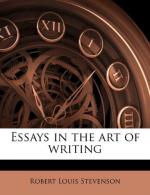Music and literature, the two temporal arts, contrive their pattern of sounds in time; or, in other words, of sounds and pauses. Communication may be made in broken words, the business of life be carried on with substantives alone; but that is not what we call literature; and the true business of the literary artist is to plait or weave his meaning, involving it around itself; so that each sentence, by successive phrases, shall first come into a kind of knot, and then, after a moment of suspended meaning, solve and clear itself. In every properly constructed sentence there should be observed this knot or hitch; so that (however delicately) we are led to foresee, to expect, and then to welcome the successive phrases. The pleasure may be heightened by an element of surprise, as, very grossly, in the common figure of the antithesis, or, with much greater subtlety, where an antithesis is first suggested and then deftly evaded. Each phrase, besides, is to be comely in itself; and between the implication and the evolution of the sentence there should be a satisfying equipoise of sound; for nothing more often disappoints the ear than a sentence solemnly and sonorously prepared, and hastily and weakly finished. Nor should the balance be too striking and exact, for the one rule is to be infinitely various; to interest, to disappoint, to surprise, and yet still to gratify; to be ever changing, as it were, the stitch, and yet still to give the effect of an ingenious neatness.
The conjurer juggles with two oranges, and our pleasure in beholding him springs from this, that neither is for an instant overlooked or sacrificed. So with the writer. His pattern, which is to please the supersensual ear, is yet addressed, throughout and first of all, to the demands of logic. Whatever be the obscurities, whatever the intricacies of the argument, the neatness of the fabric must not suffer, or the artist has been proved unequal to his design. And, on the other hand, no form of words must be selected, no knot must be tied among the phrases, unless knot and word be precisely what is wanted to forward and illuminate the argument; for to fail in this is to swindle in the game. The genius of prose rejects the cheville no less emphatically than the laws of verse; and the cheville, I should perhaps explain to some of my readers, is any meaningless or very watered phrase employed to strike a balance in the sound. Pattern and argument live in each other; and it is by the brevity, clearness, charm, or emphasis of the second, that we judge the strength and fitness of the first.




